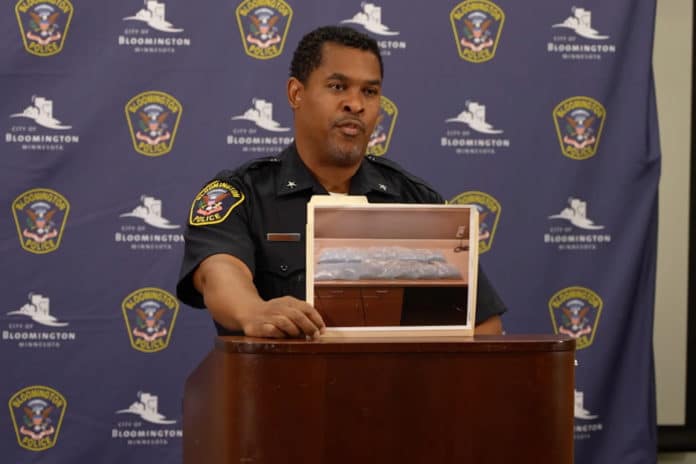
As of September, 2.5 million men, women, and children had crossed our southern border and scattered to the wind. That’s slightly less than the population of Chicago. And that’s just this year. It’s estimated at least 11 million illegal immigrants are on American soil.
This is one of the great failures of the Biden administration, as it involves more than people crossing the border illegally. Fentanyl is also pouring into the country. It’s become such an epidemic that fentanyl poisoning is the leading cause of death in the 18-45 age group.
Last week, Bloomington police seized more than 100,000 fentanyl pills in one bust. Authorities say it’s enough fentanyl to kill a fifth of our entire state population. To make matters worse, clever drug dealers now disguise fentanyl as candy. With Halloween approaching, parents are understandably concerned about rainbow fentanyl, the latest iteration of the deadly drug.
Though we live in flyover country and it’s principally a federal issue, Minnesotans shouldn’t ignore the gravity of the border crisis. It has broad implications. It should be on the radar of voters this November. It is for Gabriela Kroetch.
Twenty years ago, Kroetch came to the United States on a student visa. When it was about to expire, she refiled her paperwork to change her status. With the assistance of an immigration attorney, she applied for citizenship. Already married to an American, she underwent a series of interviews before, seven years and thousands of dollars later, she became a U.S. citizen.
As an immigrant and a candidate for Minnesota House District 55A, Kroetch says it’s fundamentally unfair to people who follow the process to allow those who don’t to enter the country. It’s not that she doesn’t empathize. She does. There’s a reason she left her life in Slovakia behind.
“From a humanity standpoint, I feel sorry for them because they’re fleeing corrupted governments that aren’t taking care of them,” she says. “But to allow people to enter illegally isn’t fair to people like me who did all of this to be here legally.”
Kroetch poses the questions we should all consider.
“What happens when they overwhelm the system? What happens in the next two years when we get another 2½ million? There’s only so much Americans can pay into a system before it collapses.”
We need rules and processes for a society to function well. When immigrants can enter the country without following the law, it puts Americans at risk. It depletes finite resources. One can be compassionate and still favor an orderly process to assimilate people who are fleeing dire situations.
If we think of our homes as a metaphor for our country, how many Americans would be okay with strangers walking in, helping themselves to food from the fridge, taking a shower, and settling in for a nap? Look to Martha’s Vineyard for an answer.
When Florida Gov. Ron DeSantis flew a group from Florida to Martha’s Vineyard last month, residents were aghast. They didn’t have the resources to care for the displaced immigrants! Within a day of their arrival, the immigrants had been relocated off the island.
We can’t continue to shuffle immigrants from city to city, often under the cover of darkness. Sending them to sanctuary cities or states doesn’t protect Americans from the litany of problems the policy has generated. Until we can elect a president who supports a secure border, our only recourse is to look to Congress to do what it can to protect America.
We have some measure of control over the issue. Every Minnesota congressional seat is on the ballot in November. If we can change the balance of power, we have a better chance of securing our border and shutting down the deadly flow of fentanyl.
The views and opinions expressed in this commentary are those of the author and do not represent an official position of Alpha News.















